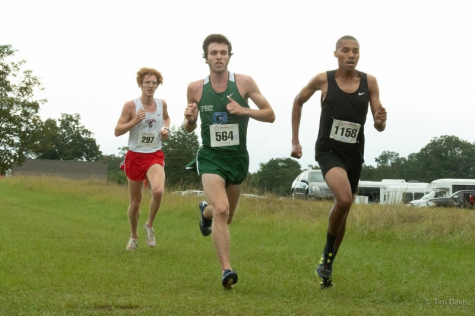College is a marathon, not a sprint: Life lessons from cross country runners
October 21, 2021
College can often feel like a long sprint. There are countless moments of dauntingly excessive assignments and professors that seem to ask more of you every time you meet. When the burnout encroaches and the mind grows weary, there’s a desire to give it up altogether. Now that the semester is over halfway complete, it’s important to slow down, check your pace and remind yourself of those goals you set back in August. In order to really understand what the phrase, “life’s a marathon, not a sprint” means, we thought cross country runners would be the ones to explain it best.
Quillian Holland is a senior from Dublin, GA currently studying management information systems. He’s been running since he was in middle school. Now he runs 10 to 11 miles a day.
“There’s a big transition from high school to college cross country,” he explained. “You go from runn ing 5k races to 8k races. Because of that you have to learn how your body adapts to the changes.”
ing 5k races to 8k races. Because of that you have to learn how your body adapts to the changes.”
But the distance of the races aren’t the only changes one will face when transitioning to college. The miles are harder and your place in the race begins to matter more.
Sydney Brown is a first year graduate student from Canton, GA studying biology. She began running freshman year of high school, but saw a big shift in her dedication when she started running for the GC cross country team.
“Racing hurts. You have to tell yourself to be tough,” Brown said. “I repeat sayings to myself to motivate myself. Something like ‘you can run for five more minutes, you really can.’ It’s kind of playing mind games with yourself honestly.”
Although the races get tougher, the runners get stronger. As they get further from the starting point the runners learn more about themselves, their dedication, their capabilities, and can prove to themselves that the victory is worth the fight.
Freshman Year
If you think of college as a long distance run, what would you find. You’d see that the first year goes by quickly and without giving it much thought, you’re through freshman year.
 “The first miles are fast,” Holland said, “your body is taking a strain from the fast pace. After that first mile, you might start to see other teams passing you at a solid speed. I might think, ‘man I need to go faster.’ But this is all part of running your own race.”
“The first miles are fast,” Holland said, “your body is taking a strain from the fast pace. After that first mile, you might start to see other teams passing you at a solid speed. I might think, ‘man I need to go faster.’ But this is all part of running your own race.”
Running your own race is a genius yet incredibly simple concept. When cross country coaches tell their team to run their own race, they’re instructing the runner to use their individual skill set to perform their best in the race.
For instance Holland explained that you’re running a race and pacing yourself off a certain runner through the entirety of the course. In that case, you’re running their race because you’re matching yourself with them. In reality, if you were running your race you could’ve passed them miles ago.
When entering college there’s a number of different races from which you can choose: the partying race, the Greek life race, the Honors College race, the loner race. At times after you
sprint that first mile, it can feel like there’s no going back. But even while you’re moving forward you can actively move in the direction of the path that serves you best.
“You have to be smart and use strategy.” Holland explained. “The best way to get that awareness is through practice.”
Holland says practice could even be trying out other people’s racing. But instead of defining yourself to that pace, speed or terrain, you’re always able to make your way to the course most in alignment with you and your skills.
Sophomore Year
The second year of college is typically where the pace slows, and the “Sophomore Slump” comes in full swing. After the sprinting start, your legs fatigue, your breath runs jagged. Maybe it’s time to slow your jog and find a pace that works for you.
“In races it’s usually the halfway point where it usually starts to hurt.” Brown said. “It’s motivating myself and knowing it’s going to be uncomfortable, like you can’t avoid being uncomfortable in a race.”
A lot of college is getting outside of your comfort zone. There’s often a moment after that first year, where you’ll find yourself reflecting. Studies show 80% of college students change majors. Sophomore year, when you slow to your pace, and you get some extra alone time on the course, you’ll find yourself making a more personalized game plan.
Cross country is lucky, they get to preview the course before they run it. In the preview they’ll run the course as a team, feeling the terrain and mentally noting the places of challenge and ease. In college you don’t get much of a test drive, but you do get a syllabus. If you know your strong suit is in writing but not presenting, give yourself the time in advance to perfect your writing so you have a cushion when it comes to presenting. Just like in races you may know to sprint before the hill so you can slow down when you get in the thick of it.
Junior Year
“I’ll think about my teammates too,” Brown said, “if not for me I’ll push through for them.”
The importance of having a community comes in handy in the thick of the race. Now is when the self-talk may be faltering and you’re questioning why you started in the first place. But it’s important in this moment to remind yourself of the goal and the people reaching for that goal beside you. Often the greatest rewards come from the greatest struggles.
Holland mentioned finding joy in the challenge of pushing his body to extremes. He thrives off understanding his natural boundaries and exceptionality. College is a lot like that. There are boundaries. There are moments of despair and there are moments of success. But like Holland, we can find joy in the challenge. Like Brown, we can reach out for help from our teammates.
“Find a support system with goals that align with yours. You become the people you surround yourself with,” Brown said, “also, try not to complain too much.”
In reality your teammates may be your class groups, coworkers or family members. By staying true to your unique skills, you’re able to stay in your race and ease the load for your teammates. Through self-encouragement you can push past the mental hurdles to find growth in your mind and body.
Senior Year
“Those last 600-800 meters, we’re speeding up.” Holland said. “So you can finish fast.”
Senior year is the time that wraps things up. It’s time to scrounge up that last bit of energy and motivation to get you through the finish line. This moment is where we can learn the most from these cross country runners. They don’t get “senioritis,” they don’t give up because the finish line is in sight. They get faster, stronger, more powerful.
“It’s easier to not care at the end of the semester,” Brown said. “It’s just reflecting on how your future self will feel is what helps me when I really want to throw the towel in.” She continued to say, “no matter if you do good or bad during a race, it’s still going to hurt. But if you do badly, you’re going to hurt and still be unhappy with the outcome.”
Being a full time student isn’t the easiest task by any means. The terrain may get rough and your mind may falter. Think about the freshman year version of you starting with a sprint. Think about the you that will cross that finish line with their arms held high. Now is the time you have to complete the work in between these two moments.
Just like running 10 miles a day, it’s challenging, but completing is proof to yourself that you’re worthy and capable.
The Aftermath
Once you cross that finish line, recovery begins. Holland said that each year you gain a
better knowledge on what your body needs to recover. Everything from a light jog to push the lactic acid out, to stretching, foam rolling and massage guns aid recovery. Sleep is Brown’s favorite. Both agree that nourishing your body is always important.
Recovery isn’t just after graduation. What’s essential is that these runners recover every day, not just after a big race. Allow yourself the space to soak up every milestone, practice gratitude for the opportunity to grow, understand what your mind and body need. Self-care, relaxation, community. These are all ways to unwind, so tomorrow you can face the course again, refreshed.
Cross country teaches us that life isn’t always easy, but that we’re capable. It teaches us that we can’t control the terrain, but we can control how we respond to it. During the semester there’s always room to slow your pace, reflect on your skills and find the best way to run your own race.




